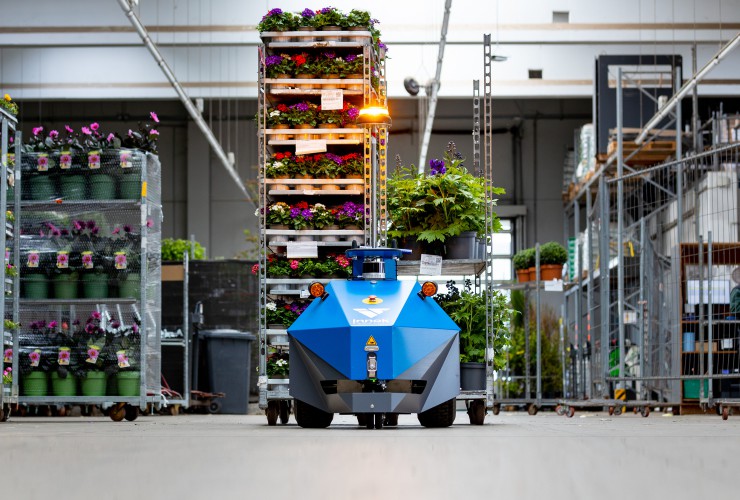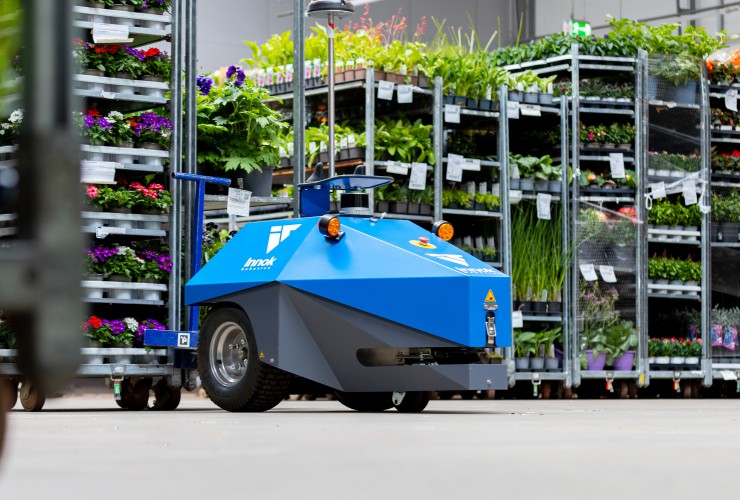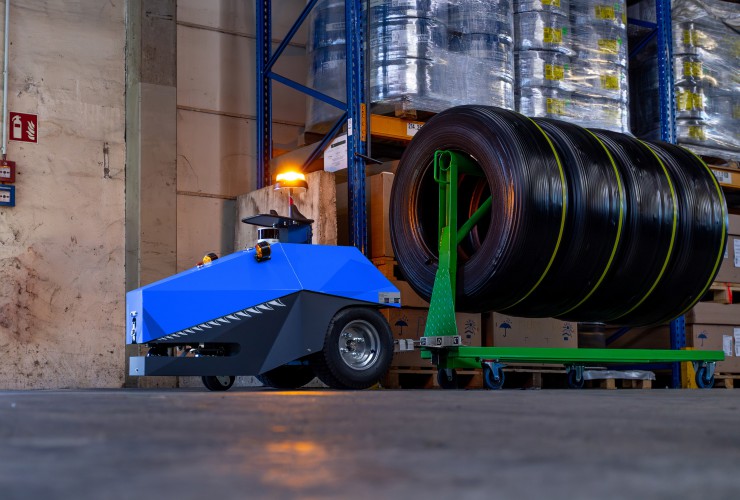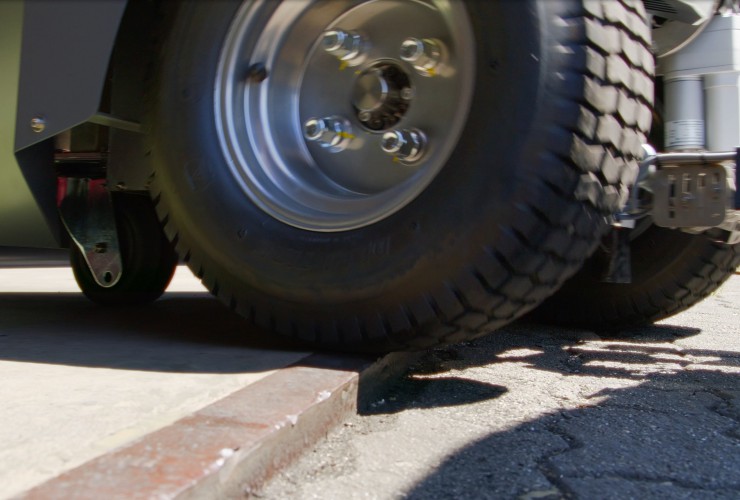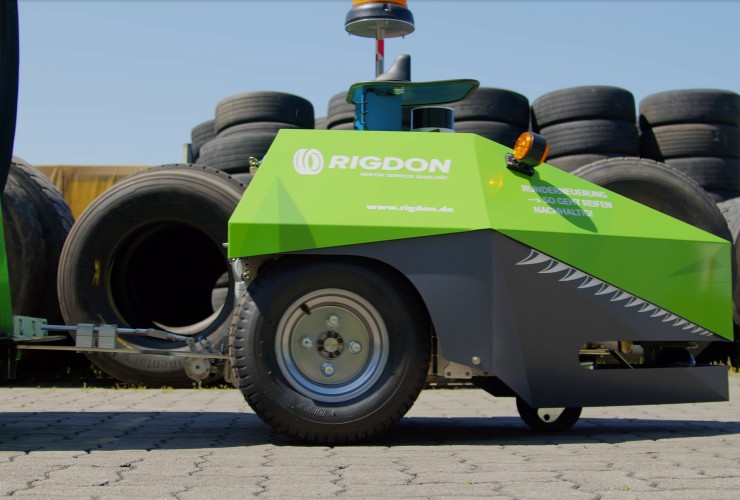IFOY Schirmherrschaft
IFOY Träger
IFOY Partner
INDUROS
Innok Robotics GmbH
IFOY-Kategorie
Mobile Robot
Zusammenfassung
Innok Robotics ist Innovationsführer und mit dem Transportroboter INDUROS der erste Hersteller von mobilen autonomen Robotern (AMR), die auch outdoor und indoor-outdoor kombiniert im Einsatz sind – völlig unabhängig von Wetter oder auch schlechten Bodenverhältnissen. Die Bedienung erfolgt dennoch intuitiv und leicht verständlich.
Beschreibung
Der autonome mobile Transportroboter INDUROS ist die erste Lösung am Markt, die nicht nur indoor, sondern auch outdoor oder bei kombinierten Missionen zum Einsatz kommt. Den Transportroboter zeichnet seine intelligente Hybridnavigation aus, die dafür sorgt, dass der Roboter mit Hilfe seiner verschiedenen Sensoren wie Lidar oder GPS zum Beispiel ohne Unterbrechungen von Innenbereichen nach draußen fahren kann. Die Hybridnavigation wählt hierbei immer die optimale Navigationsmethode aus. Zusätzliche Markierungen im Gelände oder Induktionsschleifen im Boden werden nicht benötigt. Schlechtes Wetter wie Schnee, Bodenunebenheiten oder auch Steigungen und Gefälle meistert der INDUROS leicht. Der kompakte und doch kraftvolle Roboter zieht dabei Lasten von bis zu 700 Kilogramm. Verschiedene Anhängertypen koppelt er dazu autonom an und ab ohne, dass eine Interaktion durch einen Anwender nötig wäre.
Da er sich autonom induktiv selbst lädt, kann er 24/7 im Einsatz arbeiten. Für die Kunden kommt es damit zu einem schnellen ROI. Die wichtigen Fachkräfte bei den Innok-Kunden können wieder in wertschaffenderen Bereichen als im Warentransport eingesetzt werden.
Der INDUROS erfüllt höchste Sicherheitsstandards durch extra Sensoren und stoppt in Sekundenbruchteilen, selbst wenn ein Hindernis plötzlich vor dem Roboter erscheint.
Bewerbungsdaten
Innovation
Die zentrale Innovation ist eindeutig: Der INDUROS ist der erste AMR, der auch outdoor ohne Einschränkungen im Warentransport und in der Logistik eingesetzt wird. Den Transportroboter zeichnet seine intelligente Hybridnavigation aus, die dafür sorgt, dass der Roboter durch seine verschiedenen Sensoren wie Lidar oder GPS zum Beispiel ohne Unterbrechungen von Innenbereichen nach draußen fahren kann. Extra Markierungen im Gelände, Fixpunkte oder Induktionsschleifen im Boden werden nicht benötigt. Der INDUROS fährt auch bei schlechtem Wetter wie Schnee. Bodenunebenheiten oder auch Steigungen und Gefälle meistert er leicht. An- und Abkoppelvorgänge von Transportwägen passieren autonom ohne menschliches Eingreifen.
Eine weitere Besonderheit ist das leicht zugängliche und einfach verständliche Graphical User Interface (GUI). Da Innok Robotics auch Roboter für Zielgruppen entwickelt, die normalerweise über keine spezielle Robotik- oder IT-Erfahrung verfügen, profitiert auch der INDUROS von der intuitiven Bedienoberfläche. Ein moderner Webbrowser reicht und die GUI zu erreichen und den Roboter zu bedienen.
Marktrelevanz
Die Relevanz für den Markt ist enorm. Der Transportroboter INDUROS ist bei Innok auf die Anforderungen und Wünsche vieler Industriekunden hin entwickelt worden, da diese die Möglichkeiten der autonomen mobilen Innok HEROS Plattform gesehen haben.
Daraus entstand der INDUROS als erste und einzige autonome Lösung am Markt, die nicht nur indoor bei perfekten Bodenverhältnissen, sondern auch outdoor oder kombiniert zum Einsatz kommt – ein kompakter, sehr mobiler, kraftvoller und universell einsetzbarer Transportroboter.
In vielen Industrien (zum Beispiel der Metallverarbeitung) ist er auch indoor die beste Lösung, da der INDUROS durch die Innok-Hybridnavigation auch mit schlechten oder unebenen Böden, Bodenschwellen oder anderen Hindernissen keine Probleme hat. Der allgegenwärtige Fachkräftemangel hat die Relevanz des autonomen mobilen Transportroboters weiter stark steigen lassen.
Hauptvorteile für den Kunden
- Der INDUROS ist der erste und einzige mobile autonome Transportroboter (AMR), der jedoch nicht nur indoor, sondern auch outdoor oder kombiniert zum Einsatz kommt.
- Die Innok Hybridnavigation greift unterbrechungsfrei auf die jeweils beste Form der Navigation und Sensorik zurück.
- Jegliches Wetter, schlechte Böden oder Unebenheiten sind für den INDUROS kein Problem.
- Er koppelt Anhänger autonom an und ab – es ist keine Benutzerinteraktion nötig.
- Er lädt sich selbstständig induktiv an seiner Basisstation auf.
- Er erfüllt höchste Sicherheitsstandards durch extra Sensoren und stoppt in Sekundenbruchteilen, selbst wenn ein Hindernis plötzlich vor dem Roboter erscheint.
- Innok Kunden haben den Transportroboter auch Nachts im Einsatz, wo aus Gründen des Arbeitsschutzes in der Regel sonst mehrere Mitarbeiter vor Ort sein müssen.
- Im Vergleich mit personengeführten Fahrzeugen ist der ROI beim INDUROS in kurzer Zeit erreicht. Die wichtigen Fachkräfte können in den Firmen wieder in qualifizierten Tätigkeiten eingesetzt werden.
- Die Bedienung erfolgt leicht verständlich und intuitiv über eine moderne GUI auch ohne Vorkenntnisse im Bereich Robotik und IT.
Technische Daten
Video: INDUROS x Rigdon
IFOY Test
| Name | Innok Robotics, INDUROS |
| Category | Mobile Robot |
| Date of Test | 09. -10. April 2024 |
Testbericht
Der AMR-Anbieter Innok Robotics entschied sich im Jahr 2020, sein Geschäft in zwei Richtungen zu entwickeln: die Herstellung von Bewässerungsrobotern und dem INDUROS. Letzterer ist ein mobiler autonomer Transportroboter, der Lasten sowohl im Innen- als auch im Außenbereich bewegen kann. Die Spezialisierung auf den Außenbereich entstand nach dem Studium des Unternehmensgründers, als er sich mit Sensorik und Navigation in unbekanntem Gelände beschäftigte. Heute bietet Innok Robotics eine ganzheitliche Lösung aus einer Hand an: Entwicklung, Programmierung und Montage des INDUROS, der sich im Freigelände äußerst agil bewegt.
Laut Hersteller ist dies die erste und bisher einzige Lösung auf dem Markt, die sowohl drinnen als auch draußen eingesetzt werden kann.
Der Umstand, der bisher Hersteller davon abgehalten hat, ähnliche mobile Roboter für den Außenbereich zu bauen, liegt darin, dass die Bedingungen im Freien mitunter herausfordernd sind. Es ist nass, heiß, uneben, die Sicht kann schlecht sein, es gibt Steigungen und Gefälle und viele weitere Herausforderungen, die oft die zuverlässige Funktion autonomer Fahrzeuge beeinträchtigen. Viele Unternehmen interessieren sich zwar für Autonomous Mobile Robots (AMR), verfügen jedoch nicht immer über die für diese notwendigen glatten Böden. Genau hier kommt das "Multi-Terra-AMR" INDUROS zum Einsatz und zeigt seine Stärken.
Der INDUROS, der selbst rund 165 Kilogramm wiegt, kann auf vordefinierten Wegen fahren. Die Hybridnavigation des Roboters (Lidar, GPS) greift nahtlos auf die jeweils beste Form der Navigation und Sensorik zurück. Dabei zieht er eine maximale Anhängelast von 500 bis 700 Kilogramm. Zusätzliche Markierungen im Gelände oder Induktionsschleifen im Boden werden nicht benötigt. Zur Gewährleistung höchster Sicherheit wird der Sicherheits-Sensor von Sick per Luftdruck freigeblasen, sodass das Gerät auch bei starkem Regen fahren kann und nicht blind umherfährt.
Zu den Nutzern von INDUROS, der bereits vor 4,5 Jahren beim ersten Pilotkunden eingesetzt wurde zählen Weltkonzerne wie Kubota sowie kleine und mittelständische Unternehmen, die Ersatzteile, Paletten oder lange Rohre transportieren möchten. Das benutzerfreundliche Graphical User Interface (GUI) wurde für Zielgruppen entwickelt, die keine spezielle Robotik- oder IT-Erfahrung haben. Ein moderner Webbrowser reicht aus, um das GUI zu erreichen und den Roboter zu bedienen.
Ein echtes Alleinstellungsmerkmal des INDUROS ist die autonome Koppelung und Entkoppelung seiner Anhänger, ohne dass ein Bediener anwesend sein muss. Auch die Energieversorgung erfolgt vollautomatisch: Der INDUROS fährt selbstständig zu seiner Basisstation und lädt sich dort induktiv auf. Er kann sowohl als RaaS (geleast) als auch erworben (gekauft) werden und beim Kaufmodell kann die Software gemietet werden. Derzeit befindet sich „eine dreistellige Zahl“ dieser Geräte im Einsatz.
IFOY Fazit
Obwohl das An- und Abkoppeln von Transportanhängern automatisch stattfindet, kann dennoch das Gefühl aufkommen, dass bei mehreren Anhängern am INDUROS (quasi als Routenzug) die Spurtreue nicht aufrechterhalten werden kann. Insgesamt ist der INDUROS eher für eine spezifische Marktnische geeignet. Wenn auch in Innenräumen unebene Böden oder solche mit Bodenschwellen vorhanden sind, bietet der INDUROS dennoch Anwendungsszenarien.
IFOY Innovation Check
IFOY Innovation Check
Funktionalität / Art der Umsetzung
Die angestrebte Grundfunktion, der autonome Transport von Lasten mit nahtlosem Übergang zwischen Außen- und Innenbereich, ist gegeben. Durch die Luftbereifung besteht die Fähigkeit auf unebenem Boden eine hohe Zugkraft bei geringem Fahrzeuggewicht zu realisieren. In der Umsetzung gibt es jedoch noch Entwicklungspotenzial: Zum einen wird die Schleppkurve nicht berücksichtigt, so dass bei Kurvenfahrten der Platzbedarf gegebenenfalls steigt und die Gefahr besteht, dass Personen, die sich in der Nähe des Fahrzeugs aufhalten, zu Schaden kommen. Zum anderen wird der Anhänger nach dem Abkuppeln nicht gegen Wegrollen gesichert; hier sind weitere Vorkehrungen (zum Beispiel Begrenzer im Boden) notwendig, wodurch ein kurzfristiger Wechsel des Abstellplatzes neben der Programmierung zusätzlichen Aufwand bedeutet. Die Umsetzung aller Funktionalitäten wirken durchdacht, zum Teil aber noch sehr prototypisch.
Neuheit / Innovation
Es existieren am Markt keine vergleichbaren Lösungen. Der nahtlose Übergang von Indoor (Navigation mit Lidar) zu Outdoor (Navigation mit GNNS) stellt hier eine Innovation dar. Weitere Features zur Erfüllung der Funktion (Druckluft zur Reinigung der Sensoren) sind sehr innovativ umgesetzt.
Kundennutzen
Bisherige Transporte zwischen dem Outdoor- und Indoorbereich wurden mit konventionellen manuellen Fahrzeugen oder durch Übergabestellen realisiert. Der Kundennutzen ist speziell für die Arbeit im Schichtbetrieb gegeben.
Marktrelevanz
Die maximale Anhängelast von 750 kg stellt eine relevante Begrenzung dar. Der Bedarf und damit die Relevanz autonomer Transporte ist hoch, die Markrelevanz jedoch durch die verhältnismäßig Anhängelast nur eingeschränkt. Zudem ist das Fahrzeug überwiegend für statische Routen mit Übergabestellen geeignet. Gerade durch die zunehmende Dynamik mit sich ändernden logistischen Prozessen ist hier die Marktrelevanz weiter eingeschränkt.
IFOY Fazit
Der INDUROS ist ein Schritt in Richtung Automatisierung des Transports zwischen Innen- und Außenbereich, erreicht aber aufgrund der gegebenen Funktionalitäten nur eine mittlere Marktrelevanz. Entwicklungspotenzial besteht vor allem in der Sicherheit, etwa bei den Schleppkurven, sowie einer Erhöhung der Anhängelast.
|
Funktionalität / Art der Umsetzung |
Ø |
|
Neuheit / Innovation |
++ |
|
Kundennutzen |
+ |
|
Marktrelevanz |
+ |
|
++ sehr gut / + gut / Ø ausgeglichen / - weniger / -- nicht vorhanden |
|
INDUROS
Innok Robotics GmbH
IFOY category
Mobile Robot
Summary
Innok Robotics is an innovation leader and, with the INDUROS transport robot, the first manufacturer of mobile autonomous robots (AMR) that can also be used outdoors and indoors-outdoors combined – completely independent of weather or even poor ground conditions. The operation is nevertheless intuitive and easy to understand.
Description
The autonomous mobile transport robot INDUROS is the first solution on the market that is not only used indoors, but also outdoors or in combined missions. The transport robot is characterised by its intelligent hybrid navigation, which ensures that the robot, with the help of its various sensors such as Lidar or GPS, can travel from indoor areas to outdoor areas, for example, without interruptions. The hybrid navigation always selects the optimal navigation method. Additional markings in the terrain or induction loops in the ground are not needed. The INDUROS easily masters bad weather such as snow, uneven ground or even inclines and declines. The compact yet powerful robot pulls loads of up to 700 kg. It autonomously couples and uncouples various trailer types without the need for user interaction.
Since it charges itself autonomously and inductively, the INDUROS can work 24/7. For customers, this results in a fast ROI. The important skilled workers at Innok customers can be re-employed in more value-creating areas than goods transport.
The INDUROS meets the highest safety standards with extra sensors and stops in a fraction of a second, even if an obstacle suddenly appears in front of the robot.
Entry Data
Innovation
The central innovation is clear: The INDUROS is the first AMR that can also be used outdoors without restrictions in goods transport and logistics. The transport robot is characterised by its intelligent hybrid navigation, which ensures that the robot can travel from indoor areas to outdoor areas without interruptions, for example, thanks to its various sensors such as Lidar or GPS. Extra markings in the terrain, fixed points or induction loops in the ground are not needed. The INDUROS also drives in bad weather such as snow. It easily masters uneven ground or even inclines and declines. Coupling and uncoupling of transport trolleys happens autonomously without human intervention.
Another special feature is the easily accessible and easy-to-understand Graphical User Interface (GUI). Since Innok Robotics also develops robots for target groups that normally have no special robotics or IT experience, the INDUROS also benefits from the intuitive user interface. A modern web browser is all that is needed to access the GUI and operate the robot.
Marktet relevance
The relevance for the market is enormous. The INDUROS transport robot was developed at Innok in response to the requirements and wishes of many industrial customers, as they saw the possibilities of the autonomous mobile Innok HEROS platform.
This resulted in the INDUROS as the first and only autonomous solution on the market that can be used not only indoors in perfect ground conditions, but also outdoors or in combination - a compact, very mobile, powerful and universally applicable transport robot.
In many industries (for example, metal processing) it is also the best solution indoors, as the INDUROS has no problems even with poor or uneven floors, speed bumps or other obstacles thanks to the Innok hybrid navigation.
The omnipresent shortage of skilled workers has further increased the relevance of the autonomous mobile transport robot.
Main customer benefits
- INDUROS is the first and only mobile autonomous transport robot (AMR), but it is not only used indoors, but also outdoors or combined.
- Innok Hybrid Navigation uses the best form of navigation and sensor technology without interruption.
- Any weather, bad ground or uneven surfaces are no problem for the INDUROS.
- It docks and undocks trailers autonomously – no user interaction is required.
- It charges itself inductively at its base station.
- It meets the highest safety standards with extra sensors and stops in a fraction of a second, even if an obstacle suddenly appears in front of the robot.
- Innok customers also use the transport robot at night, where several employees usually have to be on site for reasons of occupational safety.
- Compared to personnel-guided vehicles, the ROI with INDUROS is achieved in a short time. The important skilled workers can be re-employed in qualified activities in the companies.
- Operation is easy to understand and intuitive via a modern GUI, even without prior knowledge of robotics and IT.
Technical data
Video: INDUROS x Rigdon
IFOY Test
| Name | Innok Robotics, INDUROS |
| Category | Mobile Robot |
| Date of Test | April 9 to 10, 2024 |
Test Report
In 2020, AMR provider Innok Robotics decided to develop its business in two directions: the production of irrigation robots and the INDUROS. The latter is a mobile autonomous transport robot that can move loads both indoors and outdoors. The specialization in outdoor areas came about after the company founder's studies, when he was working on sensor technology and navigation in unknown terrain. Today, Innok Robotics offers a holistic solution from a single source: development, programming and assembly of the INDUROS, which moves extremely agilely in outdoor terrain. According to the manufacturer, this is the first and so far only solution on the market that can be used both indoors and outdoors.
The reason that has so far prevented manufacturers from building similar mobile robots for outdoor use is that outdoor conditions can be challenging. It's wet, hot, uneven, visibility can be poor, there are inclines and declines and many other challenges that often affect the reliable functioning of autonomous vehicles. Although many companies are interested in autonomous mobile robots (AMR), they do not always have the smooth floors they need. This is precisely where the INDUROS "Multi-Terra-AMR" shows its strengths.
The INDUROS, which itself weighs around 165 kilograms, can follow predefined routes. The robot's hybrid navigation (lidar, GPS) seamlessly uses the best form of navigation and sensor technology. It can pull a maximum trailer load of 500 to 700 kilograms. Additional markings in the terrain or induction loops in the ground are not required. To ensure maximum safety, the safety sensor of Sick is blown free by air pressure so that the device can drive even in heavy rain and does not blind.
Users of INDUROS, which was used by the first pilot customer four and a half years ago, include global corporations such as Kubota as well as small and medium-sized companies that want to transport spare parts, pallets or long pipes. The user-friendly Graphical User Interface (GUI) was developed for target groups that have no special robotics or IT experience. A modern web browser is all that is needed to access the GUI and operate the robot.
A truly unique feature of the INDUROS is the autonomous coupling and uncoupling of its trailers without the need for an operator to be present. The energy supply is also fully automatic: the INDUROS drives itself to its base station and charges itself inductively there. It can be purchased or leased as RaaS, and the software can be rented with the purchase model. There are currently "a three-digit number" of these devices in use.
IFOY Verdict
Although the coupling and uncoupling of transport trailers takes place automatically, the feeling can still arise that it is not possible to maintain directional stability with several trailers on the INDUROS (quasi as a tugger train). Overall, the INDUROS is more suitable for a specific market niche. Even if there are uneven floors or floors with thresholds indoors, the INDUROS still offers application scenarios.
IFOY Innovation Check
IFOY Innovation Check
Functionality / Type of implementation
The desired basic function, the autonomous transportation of loads with a seamless transition between the outside and inside areas, is given. The pneumatic tyres enable a high tractive force to be achieved on uneven ground with a low vehicle weight. However, there is still potential for development in the implementation: on the one hand, the towing curve is not considered, so that the space requirement may increase when cornering and there is a risk of injury to people in the vicinity of the vehicle. On the other hand, the trailer is not secured against rolling away after uncoupling; further precautions (e.g. limiters in the floor) are necessary, which means that changing the parking space at short notice causes additional work in addition to programming. The implementation of all functionalities appears well thought-out, but in some cases still very prototypical.
Novelty / Innovation
There are no comparable solutions on the market. The seamless transition from indoor (navigation with Lidar) to outdoor (navigation with GNNS) is an innovation. Other features to fulfill the function (compressed air for cleaning the sensors) are implemented in a very innovative way.
Customer benefit
Previous transports between the outdoor and indoor areas were carried out using conventional manual vehicles or transfer points. The customer benefit is particularly important in shift work.
Market relevance
The maximum trailer load of 750 kg is a relevant limitation. The demand and thus the relevance of autonomous transportation is high, but the market relevance is limited due to the restricted towing capacity. In addition, the vehicle is mainly suitable for static routes with transfer points. The increasing dynamics with changing logistics processes in particular further limit the market relevance here.
IFOY verdict
The INDUROS is a step towards automating transport between indoor and outdoor areas, but only achieves medium market relevance due to the existing functionalities. There is potential for development above all in terms of safety, for example in the towing curves, as well as an increase in towing load.
|
Functionality / Type of implementation |
Ø |
|
Novelty / Innovation |
++ |
|
Customer benefit |
+ |
|
Market relevance |
+ |
|
++ very good / + good / Ø balanced / - less / -- not available |
|












